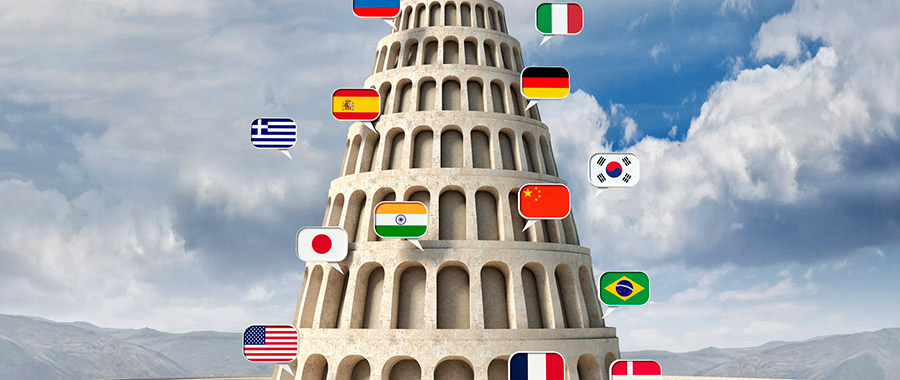Language, an intricate tapestry woven through human history, profoundly shapes our realities and interactions. In a world marked by complexity and division, the Bahá’í teachings present an illuminating proposition: could a universal language indeed foster global harmony? The metaphor of Babel, synonymous with confusion and fragmentation, serves as an insightful backdrop for this discourse. The Tower of Babel, a biblical narrative, reflects humanity’s aspirations and subsequent failures to communicate, highlighting a poignant paradox—while language serves as a bridge, it can also become a barrier.
Throughout history, diverse languages have enriched cultures while simultaneously engendering misunderstandings. The proliferation of languages has not only reflected the uniqueness of various communities but has also led to a cacophony of discord. With this in mind, the Bahá’í perspective advocates for the adoption of a universal language as a means to mitigate such discord and enhance mutual understanding. This endeavor transcends mere linguistics; it embodies a quest for unity in diversity.
The concept of a universal language in Bahá’í philosophy encompasses several dimensions. Firstly, it is an instrument for dismantling the barriers of prejudice and misunderstanding. As humans, our foundational desire for connection often succumbs to the limitations imposed by linguistic diversity. A universal tongue could serve as a common thread, binding individuals across cultural and geographical divides. This endeavor is not simply about the vocabulary or grammar of a language; it requires an elemental shift in human consciousness towards inclusivity and empathy.
Moreover, adopting a universal language aligns with the broader Bahá’í principle of the oneness of mankind. This principle emphasizes the intrinsic value of each individual while simultaneously advocating for collective advancement. By facilitating dialogue across linguistic boundaries, a universal language promotes the idea that all human beings are part of a singular familial tapestry, thus encouraging a culture of peace and collaboration. The idea is not to erase linguistic diversity but rather to cultivate a framework within which difference is not merely tolerated but celebrated.
However, the realization of such a vision poses considerable challenges. The resurrection of a universal language must overcome cultural pride and attachment to native tongues. Historical precedents, such as the imposition of a dominant language over others, have often led to cultural erosion and resentment. Therefore, any movement towards a universal language must ensure that it is embraced willingly, grounded in respect for existing languages and their speakers. It must evolve organically, promoting linguistic diversity while fostering a greater understanding among all cultural groups.
In envisioning a universal language, one can draw inspiration from the idea of language as a living entity, capable of adaptation and growth. Just as flora in a thriving ecosystem coexists and intermingles, languages too can harmonize. This metaphor accentuates the beauty inherent in language evolution. A universal language, rather than overshadowing native tongues, could integrate elements from various languages, cultivating a rich hybrid that enhances creativity and expression.
Furthermore, the role of technology in this linguistic transformation cannot be understated. Technological advancements provide unprecedented opportunities for communication and learning. The proliferation of online platforms has created a global village, where interactions transcend geographical and linguistic boundaries. Innovations like real-time translation tools are laying the groundwork for a more interconnected world. As we embrace technology, we must recognize its potential to support the emergence of a universal language, intertwining the digital age with the rich fabric of human culture.
Education, as a cornerstone of this initiative, carries immense significance. Instruction in a universal language from an early age could empower future generations to engage more meaningfully on the international stage. Educational institutions have a unique opportunity to foster curricula that emphasize linguistic dexterity, critical thinking, and cultural awareness. By nurturing a sense of global citizenship, educational systems can cultivate a generation equipped to transcend linguistic confines and advocate for peace.
Additionally, the arts play a crucial role in this linguistic renaissance. Through literature, music, and visual arts, expressions of universal language can emerge, resonating with audiences across varying cultures. Artistic endeavors often supersede linguistic barriers, fostering understanding on a subtle yet profound level. This cultural symbiosis not only heightens appreciation for diverse crafts but also enhances the emotional resonance of shared human experience.
In contemplating the practical implications of introducing a universal language, one must address concerns surrounding language preservation. The richness of human expression is deeply intertwined with local languages, which preserve unique cultural heritages, philosophies, and worldviews. Thus, the pursuit of a common tongue should not encourage the marginalization of indigenous languages. Instead, it should serve as a call to action for the revitalization and protection of these languages, ensuring that expression remains as diverse and multifaceted as humanity itself.
In conclusion, the Bahá’í teachings on the potential of a universal language illuminate a path towards global peace by advocating for understanding, inclusivity, and recognition of our shared humanity. The polarization stemming from linguistic diversity presents an opportune challenge to transcend, emphasizing the necessity for concerted efforts towards linguistic unity. By leveraging technology and fostering a culture of respect, collaboration, and education, we can aspire to realize this vision. Ultimately, language, when embraced as a tool for unity, has the potential to transcend the limits of Babel and manifest a harmonious world where dialogue flourishes and peace prevails.
